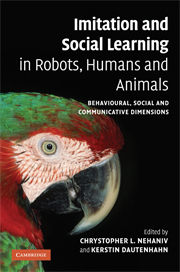 Imitation and Social Learning in Robots, Humans and Animals
Imitation and Social Learning in Robots, Humans and Animals Book contents
- Frontmatter
- Contents
- List of plates
- List of figures
- List of tables
- List of contributors
- Introduction: the constructive interdisciplinary viewpoint for understanding mechanisms and models of imitation and social learning
- Part I Correspondence problems and mechanisms
- Part II Mirroring and ‘mind-reading’
- Part III What to imitate?
- Part IV Development and embodiment
- Part V Synchrony and turn-taking as communicative mechanisms
- Part VI Why imitate? – Motivations
- Part VII Social feedback
- Part VIII The ecological context
- 20 Emulation learning: the integration of technical and social cognition
- 21 Mimicry as deceptive resemblance: beyond the one-trick ponies
- Index
- Plate section
- References
20 - Emulation learning: the integration of technical and social cognition
Published online by Cambridge University Press: 10 December 2009
- Frontmatter
- Contents
- List of plates
- List of figures
- List of tables
- List of contributors
- Introduction: the constructive interdisciplinary viewpoint for understanding mechanisms and models of imitation and social learning
- Part I Correspondence problems and mechanisms
- Part II Mirroring and ‘mind-reading’
- Part III What to imitate?
- Part IV Development and embodiment
- Part V Synchrony and turn-taking as communicative mechanisms
- Part VI Why imitate? – Motivations
- Part VII Social feedback
- Part VIII The ecological context
- 20 Emulation learning: the integration of technical and social cognition
- 21 Mimicry as deceptive resemblance: beyond the one-trick ponies
- Index
- Plate section
- References
Summary
A decade ago, the term emulation had been used by Tomasello (1990) to describe the performance of chimpanzees that seemed to him neither imitative nor a result of simple motivational or attentional influences. However, some researchers have questioned if emulation has been sufficiently well established to be used as a valid alternative in attempts to discover imitation, and whether its definition is precise enough for reliable identification of its operation (Byrne, 1998). As is a common feature of the social learning literature, the term has different meanings in different domains (e.g. Wood, 1989; Whiten and Ham, 1992). Let me first recall what Tomasello and his colleagues (Tomasello et al., 1987; Tomasello, 1990, 1996, 1998) have found and then add some recent evidence, including our findings, for this underestimated learning phenomenon. This endeavour will not only reveal that many findings reported in the literature support the emulation learning account if re-evaluated by recent methodological and theoretical developments (Huang et al., 2002; Want and Harris, 2002; Horowitz, 2003; Whiten et al., 2004; Zentall, 2004), but also that imitation has been dramatically overestimated in terms of occurrence and importance.
In a study by Tomasello et al. (1987) different groups of chimpanzees were presented with three experimental conditions. The first group observed a conspecific demonstrator using a T-bar to rake food items into reach. The second group observed a chimpanzee simply manipulating the tool without a food item being present. The third group did not observe any demonstrator.
Information
- Type
- Chapter
- Information
- Imitation and Social Learning in Robots, Humans and AnimalsBehavioural, Social and Communicative Dimensions, pp. 427 - 440Publisher: Cambridge University PressPrint publication year: 2007
References
Accessibility standard: Unknown
Why this information is here
This section outlines the accessibility features of this content - including support for screen readers, full keyboard navigation and high-contrast display options. This may not be relevant for you.Accessibility Information
- 4
- Cited by